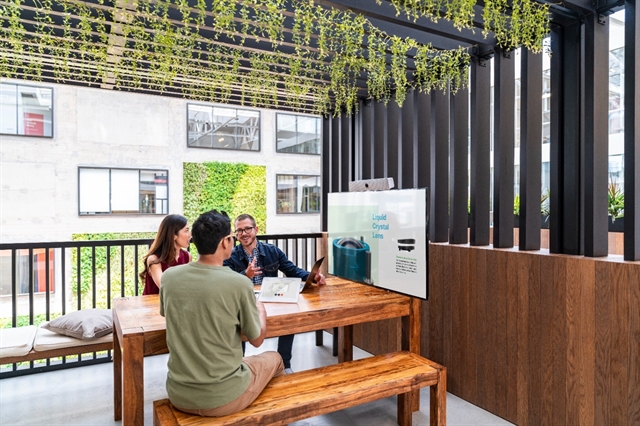
HÀ NỘI — Hybrid working has improved total employee wellbeing, work-life balance, and performance in Việt Nam, according to a new global Cisco study.
While organisations have benefited from higher employee productivity levels, more needs to be done to build an inclusive culture and fully embed hybrid work arrangements to boost readiness levels and enhance employee experience.
Cisco’s “Employees are ready for hybrid work, are you?” study found that 70 per cent of employees in Việt Nam believe that the quality of work has improved. A similar number (67 per cent) felt that their productivity has enhanced. On top of that, 84 per cent also feel their role can now be performed just as successfully remotely as in the office. However, the survey of 28,000 employees from 27 countries, including over 1,050 respondents from Việt Nam, reveals that only 37 per cent of Vietnamese employees think that their company is “very prepared” for a hybrid work future.
“The last two years have shown us that work is no longer where we go, but what we do. In a hybrid normal, employees and employers in Viet Nam are experiencing tangible benefits from improved employee wellbeing to better productivity and work performance,” said Lương Thị Lệ Thủy, Managing Director, Cisco Vietnam.
“However, hybrid work is more than just supporting a safe office re-entry. Leaders need to rethink how to cultivate an inclusive culture, place employees – their experience, engagement and wellbeing – at the centre, and modernise their networking and security infrastructure to provide a seamless, secure and inclusive employee experience,” she added.
Cisco’s research examined the impact of hybrid working on five categories of well-being – emotional, financial, mental, physical, and social well-being – with a good majority (85 per cent) saying hybrid and remote working has improved various aspects of their well-being.
Time away from the office has improved work-life balance for 88 per cent of employees in Việt Nam.
Nearly 89 per cent Vietnamese respondents also say that their financial wellbeing improved, with their average savings reaching to over VNĐ178 million (US$7,696) a year.
In addition, 86 per cent of respondents believe their physical fitness has improved with remote working.
A significant majority (91 per cent) indicate that remote working has improved family relationships and 61 per cent of the respondents reporting strengthened relationships with friends.
The future of work is hybrid, according to 76 per cent of employees in Việt Nam who say they want a combination of a remote and in-office hybrid working model in the future, compared to a fully remote (19 per cent) and fully in-office (4 per cent) experience.
However, there is uncertainty over how different work styles might impact inclusion and engagement. Over 72 per cent of Vietnamese respondents believe micromanaging behaviours had increased with hybrid and remote working. A lack of trust from managers that their employees can be productive have been a common thorn in their working experience.
“Trust has become a core tenet in our hybrid work normal, alongside flexibility, and empathetic leadership. Our latest research indicates that more needs to be done to fully integrate hybrid work arrangements for employees, especially when it comes to building an inclusive culture powered by efficient technology infrastructure in this new world of working that employees clearly prefer. Leaders and companies need to commit to actions that go a long way to retain their people – listening, building trust, and leading with empathy, flexibility, and fairness,” said Anupam Trehan, Senior Director, People & Communities, Cisco, APJC.
At the same time, technology will remain critical to enabling a future with increasingly diverse and distributed workforces. 81 per cent of respondents believe having connectivity issues regularly is career-limiting for remote workers.
83 per cent of respondents in Việt Nam believe that cybersecurity is critical for making hybrid working safe, and 73 per cent say their organisation currently has the right capabilities and protocols in place. Only 72 per cent think that all employees across their company understand the cyber risks involved with hybrid work, and 79 per cent think that business leaders are familiar with the risks.
“Technology is a key enabler of growth in the hybrid workplace, and it needs to be underpinned by end-to-end integrated security. Organisations should prioritise a robust security posture that underpins every digitalisation effort and ensure that cybersecurity is at the core of their technology architecture. Amid the expanded attack surface area today as more users and devices connect to corporate applications, organizations will need to bolster security and build greater vigilance, through enabling secure access and protecting users and endpoints in the network and the cloud,” said Juan Huat Koo, Director, Cybersecurity, Cisco ASEAN. —VNS
- Reduce Hair Loss with PURA D’OR Gold Label Shampoo
- Castor Oil Has Made a “Huge” Difference With Hair and Brow Growth
- Excessive hair loss in men: Signs of illness that cannot be subjective
- Dịch Vụ SEO Website ở Los Angeles, CA: đưa trang web doanh nghiệp bạn lên top Google
- Nails Salon Sierra Madre
 VnExpress News The News Gateway of Vietnam
VnExpress News The News Gateway of Vietnam




